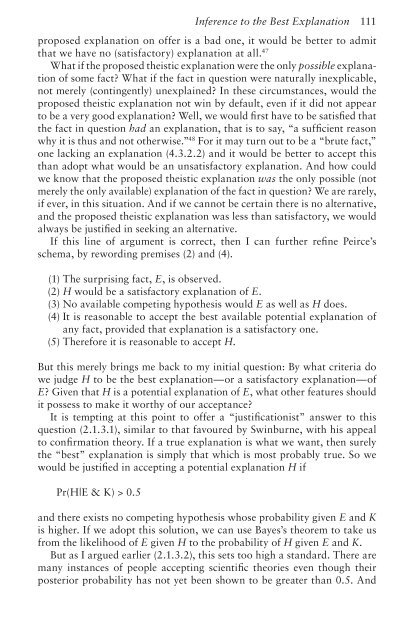Theism and Explanation - Appeared-to-Blogly
Theism and Explanation - Appeared-to-Blogly
Theism and Explanation - Appeared-to-Blogly
You also want an ePaper? Increase the reach of your titles
YUMPU automatically turns print PDFs into web optimized ePapers that Google loves.
Inference <strong>to</strong> the Best <strong>Explanation</strong> 111<br />
proposed explanation on offer is a bad one, it would be better <strong>to</strong> admit<br />
that we have no (satisfac<strong>to</strong>ry) explanation at all. 47<br />
What if the proposed theistic explanation were the only possible explanation<br />
of some fact? What if the fact in question were naturally inexplicable,<br />
not merely (contingently) unexplained? In these circumstances, would the<br />
proposed theistic explanation not win by default, even if it did not appear<br />
<strong>to</strong> be a very good explanation? Well, we would fi rst have <strong>to</strong> be satisfi ed that<br />
the fact in question had an explanation, that is <strong>to</strong> say, “a suffi cient reason<br />
why it is thus <strong>and</strong> not otherwise.” 48 For it may turn out <strong>to</strong> be a “brute fact,”<br />
one lacking an explanation (4.3.2.2) <strong>and</strong> it would be better <strong>to</strong> accept this<br />
than adopt what would be an unsatisfac<strong>to</strong>ry explanation. And how could<br />
we know that the proposed theistic explanation was the only possible (not<br />
merely the only available) explanation of the fact in question? We are rarely,<br />
if ever, in this situation. And if we cannot be certain there is no alternative,<br />
<strong>and</strong> the proposed theistic explanation was less than satisfac<strong>to</strong>ry, we would<br />
always be justifi ed in seeking an alternative.<br />
If this line of argument is correct, then I can further refi ne Peirce’s<br />
schema, by rewording premises (2) <strong>and</strong> (4).<br />
(1) The surprising fact, E, is observed.<br />
(2) H would be a satisfac<strong>to</strong>ry explanation of E.<br />
(3) No available competing hypothesis would E as well as H does.<br />
(4) It is reasonable <strong>to</strong> accept the best available potential explanation of<br />
any fact, provided that explanation is a satisfac<strong>to</strong>ry one.<br />
(5) Therefore it is reasonable <strong>to</strong> accept H.<br />
But this merely brings me back <strong>to</strong> my initial question: By what criteria do<br />
we judge H <strong>to</strong> be the best explanation—or a satisfac<strong>to</strong>ry explanation—of<br />
E? Given that H is a potential explanation of E, what other features should<br />
it possess <strong>to</strong> make it worthy of our acceptance?<br />
It is tempting at this point <strong>to</strong> offer a “justifi cationist” answer <strong>to</strong> this<br />
question (2.1.3.1), similar <strong>to</strong> that favoured by Swinburne, with his appeal<br />
<strong>to</strong> confi rmation theory. If a true explanation is what we want, then surely<br />
the “best” explanation is simply that which is most probably true. So we<br />
would be justifi ed in accepting a potential explanation H if<br />
Pr(H|E & K) > 0.5<br />
<strong>and</strong> there exists no competing hypothesis whose probability given E <strong>and</strong> K<br />
is higher. If we adopt this solution, we can use Bayes’s theorem <strong>to</strong> take us<br />
from the likelihood of E given H <strong>to</strong> the probability of H given E <strong>and</strong> K.<br />
But as I argued earlier (2.1.3.2), this sets <strong>to</strong>o high a st<strong>and</strong>ard. There are<br />
many instances of people accepting scientifi c theories even though their<br />
posterior probability has not yet been shown <strong>to</strong> be greater than 0.5. And



